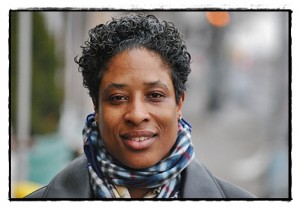Movers and Shakers in Hamtown …
Who is she?
Stephanie Y. Penn, age 43, formerly of Kalamazoo and also with ties to Canton, MI. Stephanie heads up the local chapters of N.A. (Narcotics Anonymous) and A.A. (Alcoholics Anonymous). A recovered addict herself, she is a former Marine, and holds a Masters in Social Work as well as being an Executive Chef, trained at Johnson and Walls in Rhode Island.
So what is your position exactly?
I don’t have a formal title or position; I’m simply coordinating the A.A. and N.A. programs here in Hamtramck, because I moved here recently, and I then saw a need for it locally. I’m trying to be what I’d term a Community Advocate.
Is there anything that specifically qualifies you for this work, other than your degree? Do there even need to be “special qualifications”?
It comes from a passion that I have for helping people. I took it upon myself to just go out and do it. I canvass the neighborhoods of the city, going door to door to talk to everyone I can. Like many social workers and teachers, I spend money out of pocket, for example to reproduce some of the self-help materials. That’s the commitment I’m trying to show, to let people know there’s help out there, and how they can get it.
Is Hamtramck different than other communities with regard to N.A. and A.A. needs, or related issues?
I think so, yes! There seems to be more segregation here, in terms of everyone sticking close within their own culture, whether it’s Bosnian or Croatian, Bangladeshi, African American, Polish, what have you. I’m hoping it can get to a place where they can all feel comfortable coming in and sharing their woes, but also their positives, their strengths.
Tough times often create tougher circumstances, challenges. Are you sensing more need lately for these programs?
Oh, no question about it. This is a largely working-class town, one way or another, and their comfort zones have eroded in a lot of instances. Recovery involves an ability to change one’s mindset, to try to find new ways to cope, especially in a more community way. I’m trying to develop a program I call “Strategies for Self-Improvement and Change,” a sort of pathway to overcoming addiction among both the AOD (Alcohol and Other Drugs) individuals, and the CC (Criminal Conduct) ones, with whom there is often a lot of overlap.
Surprisingly to me, you discourage donations, is that true?
We try to be completely self-supporting. This mirrors what we’re trying to instill in ourselves within the group, the idea of taking personal responsibility.
What else might surprise us about the organization?
Well, we stress reading out loud from the materials, as opposed to too much talking. Naturally, there’s bound to be a bit of conversation, but what we try to avoid is having a meeting turn into a woe-is-me session, or too much commiserating. We stress literature study over open discussion. We want to try to help people resolve their issues, and they can always linger and talk about their personal stuff with each other afterward.
Do you offer any other types of assistance or info, for example legal aid, or help getting social services?
These are what I term “outside issues,” and as such, they’re outside the scope of the meeting per se. We aren’t a social service agency. After a meeting, or before, we might be able to address it, but not during.
How does the police department feel about your work — are they supportive?
I think so. It helps that I’ve gone to every non-profit in town, every church. I’ve spoken with City Hall, Community Development, the Chief of Police, so they have all gotten to know me, and what we’re trying to do here.
Tell us something that might surprise us about N.A./A.A. attendees.
Maybe that it’s not a black, white, Bosnian, whatever issue. It cuts across many cultural lines. Also, that a lot of people are embarrassed, at least at the first meeting. Often, they have only shared their issue with family, if anyone, at that point. So there is a certain vulnerability there that has to be considered.
What happens if you suddenly don’t see someone who had been coming regularly? Is there an internal support system?
There is. There’s normally a sponsor assigned to a person, someone who can be available between meetings. People are often motivated during and right after a meeting. It’s the time in between, where temptations can present themselves. Some in A.A. have created a “Back to Basics” off-shoot program, where they try to redouble their efforts to adhere more rigidly to the core principles of the A.A. program.
Where do you hold your meetings?
At the Peoples Community Services Building at 8625 Jos. Campau. A.A. meetings are every Thursday from 10 a.m.to noon. N.A. meetings are every Wednesday from 10 a.m. to noon.
Anything else you’d like to leave the readers with?
I think, like President Obama has said, we all need to involve ourselves as much as we can at the community, grass roots level. It’s the sense of community that helps people find their strength. It’s when people get to feeling isolated that they begin to have these kinds of negative social issues, but with help, we can all try to move forward.


